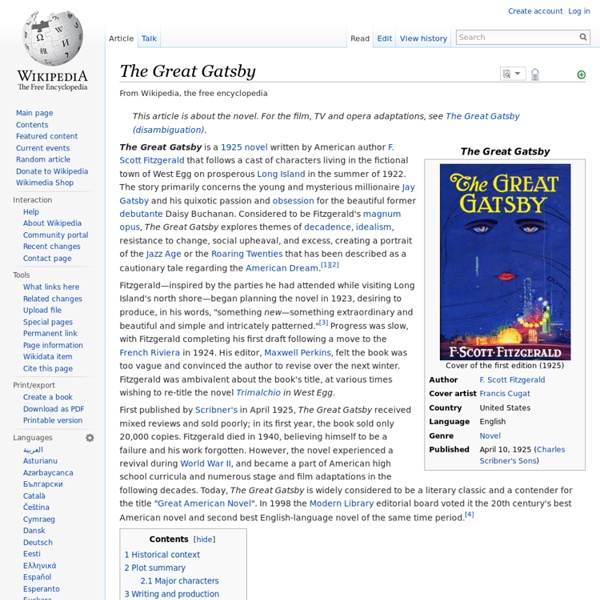F. Scott Fitzgerald
Francis Scott Key Fitzgerald (September 24, 1896 – December 21, 1940) was an American author of novels and short stories, whose works are the paradigmatic writings of the Jazz Age, a term he coined. He is widely regarded as one of the greatest American writers of the 20th century.[1] Fitzgerald is considered a member of the "Lost Generation" of the 1920s. He finished four novels: This Side of Paradise, The Beautiful and Damned, The Great Gatsby (his most famous), and Tender Is the Night. A fifth, unfinished novel, The Love of the Last Tycoon, was published posthumously. Fitzgerald also wrote many short stories that treat themes of youth and promise along with age and despair. Life and career[edit] Born in 1896 in Saint Paul, Minnesota, to an upper-middle-class family, Fitzgerald was named after his famous second cousin, three times removed, Francis Scott Key,[2] but was referred to by the familiar moniker Scott Fitzgerald. Zelda Fitzgerald[edit] "The Jazz Age"[edit] F.
An Abundance of Katherines
An appendix explaining some of the more complex equations Colin uses throughout the story was written by Daniel Biss, a close friend to Green. Following the announcement of the name of his latest book, The Fault in Our Stars, after which John Green's fans made hundreds of book covers, Penguin announced a contest in which they would allow the fans (known as "nerdfighters") to design the new cover of An Abundance of Katherines. Plot summary[edit] Colin Singleton is an anagram-loving seventeen-year-old boy who has become depressed because though he has maintained his status of a prodigy, he has not yet become a “genius.” After graduating from high school, and before college, Colin's best and only friend convinces him to go on a road trip with him to take his mind off the breakup. As time passes, Colin finds himself becoming attracted to Lindsey, though matters are somewhat complicated by her on-again, off-again boyfriend Colin (he and Hassan call him TOC, "the other Colin"). Awards[edit]
The Fault in Our Stars
Plot[edit] Hazel explains the magnificence of An Imperial Affliction: It is a novel about a girl named Anna who has cancer, and it's the only account she's read of living with cancer that matches her experience. She describes how the novel maddeningly ends midsentence, denying the reader closure about the fate of the novel’s characters. She speculates about the novel’s mysterious author, Peter Van Houten, who fled to Amsterdam after the novel was published and hasn’t been heard from since. A week after Hazel and Augustus discuss the literary meaning of An Imperial Affliction, Augustus miraculously reveals he tracked down Van Houten's assistant, Lidewij, and through her he's managed to start an email correspondence with the reclusive author. He shares Van Houten's letter with Hazel, and she devises a list of questions to send Van Houten, hoping to clear up the novel’s ambiguous conclusion. Augustus dies eight days later. Writing[edit] Publication history[edit] Critical reception[edit]
John Green (author)
John Michael Green (born August 24, 1977) is an American author of young adult fiction and a YouTube video blogger and creator of online educational videos. He won the 2006 Printz Award for his debut novel, Looking for Alaska,[1] and his most recent novel, The Fault in Our Stars debuted at number 1 on The New York Times Best Seller list in January 2012.[2] Green was born in Indianapolis to Mike and Sydney Green[3] and his family moved three weeks after he was born[4] to Orlando, Florida.[5] He attended Lake Highland Preparatory School and Indian Springs School (which he later used as the main setting for Looking for Alaska),[6] a boarding and day school outside of Birmingham, Alabama and graduated from Kenyon College in 2000 with a double major in English and Religious Studies. He has spoken about being bullied as a teenager and how it made life miserable for him.[7] Green's first novel, Looking for Alaska, was published by Dutton Children's Books in 2005.
Looking for Alaska
Synopsis[edit] Looking for Alaska opens as the protagonist, Miles Halter, leaves his home in Florida to attend Culver Creek Preparatory High School in Alabama for his junior year. He uses Francois Rabelais’s last words—"I go to seek a Great Perhaps"—as his argument for choosing boarding school at such a late age. Miles is fond of reading biographies, and particularly of memorizing the subjects' last words. Soon after arriving at Culver Creek, Miles meets his roommate, Chip "The Colonel" Martin. The eve of his first day at Culver Creek, Pudge is grabbed out of his bed, duct-taped, and tossed into a nearby lake by the "Weekday Warriors," a group of rich Birmingham-area students of Culver Creek. Alaska sets Pudge up with a girl, Lara. In the morning, the Eagle held an assembly, telling the students of Alaska's death. Characters[edit] Miles Halter The novel's protagonist, who has an unusual interest in learning famous people's last words. Alaska Young Chip Martin Takumi Hikohito Lara Buterskaya
Paper Towns
Plot summary[edit] The first characters they visit are Margo’s ex-boyfriend Jase and the girl with whom he was cheating on Margo, Becca. Quentin calls Becca's parents to inform them about their daughter having sex with Jase. As Jase attempts to escape, Quentin takes a picture of him. Margo and Q return to their homes close to the time they are supposed to be getting up in the morning to go to school. Eventually the clues lead Q to believe that Margo may be hiding out (or buried) in one of the many abandoned subdivision projects around Orlando; what Q’s mother likes to call "pseudodivisions". Characters[edit] Quentin “Q” Jacobsen- The protagonist and narrator of the story. Margo Roth Spiegelman- Margo is a self described Paper Girl who runs away from home only to be pursued by her childhood friend, Q. Ben Starling- He is one of Quentin's best friends. Style[edit] The novel is written in parts. Background[edit] Also, throughout the novel paper towns are mentioned numerous times.



